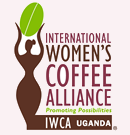The International Women’s Coffee Alliance (IWCA) is a global network of women in coffee formed in 2003 to advocate for the reduction of barriers for women in coffee producing countries by providing access to resources while creating a forum through which women connect with others throughout the coffee value chain.
IWCA member countries contribute to the overall vision and mission of IWCA at the global level under their respective Chapters.
The Chapters are classified into three categories;
The first category comprises the producing countries chapters that start the supply chain. These include Uganda, Kenya, Tanzania, DRC, Rwanda, El Salvador, Guatemala, Ethiopia, Burundi, Brazil, Colombia, Philippines, Cameroon, and others.
The second category comprises the consuming countries chapters (CCCs). This is an alliance of women in the coffee sector in consuming countries like the United States, Canada and Japan.
The third category is that of the provisional chapters, which are responsible for relations and formation of new chapters.
